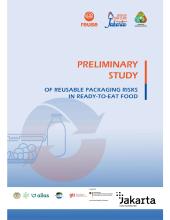Preliminary Study of Reusable Packaging Risks in Ready-to-Eat Food

Single-use packaging has provided convenience for its users but also presents various problems such as environmental problems, social problems, and then also economic problems. Replacing single-use packaging with reusable packaging is seen as a promising solution. However, to implement reusable packaging on a massive scale, it is necessary to implement agreed standards to ensure its use can be accepted without any problems.
One of the uses of single-use packaging that needs to be replaced with reusable packaging is in food packaging, including ready-to-eat processed food. The standard that must be considered in food packaging is food safety. To establish reusable packaging standards for ready-to-eat processed food, the Indonesian Plastic Bag Diet Movement (GIDKP) with support from GIZ within the framework of the “Collaboration Action for Single Use Plastic Prevention in the Southeast Asia (CAP SEA)” project, cooperated with the Food and Drug Supervisory Agency (BPOM) of the Republic of Indonesia to make a Preliminary Study on Packaging Risks in Ready-to-eat Food. The production of this document was supported by SEAFAST Center, Bogor Agricultural University, and PR3 (Partnership to Reuse, Refill, Replace Single-Use Plastics).
This document is the first part of a series of studies and preparations carried out to meet food safety standards by using reusable packaging that is accepted by the world food safety system.
CAP SEA is a module of GIZ’s global project to support the German Federal Ministry for the Environment, Nature Conservation, Nuclear Safety and Consumer Protection (BMUV)’s Export Initiative Environmental Protection.
Tiza Mafira